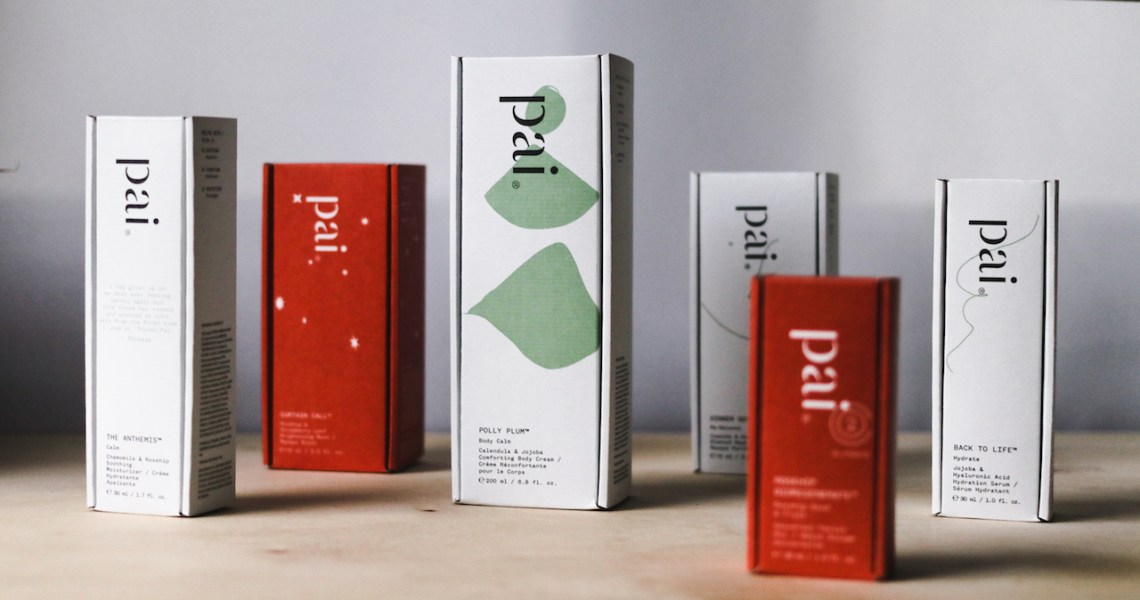Thirteen-year-old Pai, one of the beauty industry’s original clean skin-care brands, revealed a rebrand on Thursday aimed at better commercializing and communicating the brand’s positioning.
The rebrand focuses on two main aspects: packaging design and third-party certification. The packaging was updated to not only be more sustainable, but to also better communicate what Pai is and its brand positioning, which dovetails with third-party certification to provide credibility.
Pai’s core customer demographic is women in their 30s, typically with a young family, said Sarah Brown, Pai founder and CEO. Approximately 70% of Pai’s sales are wholesale versus 30% DTC, but e-commerce sales have grown by 70% between March and May, said Brown. Pai earned $10 million in 2019 sales, and Brown said the brand expects to achieve its projected sales growth of 25-30% this year.
“The word ‘clean’ has really exploded and grown this sort of ‘natural category,’ but not always in a good way,” said Brown. “There’s huge confusion about what clean means. We don’t even go there; we say, ‘Forget clean, we’re way beyond clean [because we are] certified organic,’ and then we explain what that means.”
Brown said the original packaging did not properly communicate what U.K.-based Pai was or what it did. It now features clear information on what the product is intended to help with and the fact that Pai makes its own products (rather than relying on white-label manufacturing). Additionally, the packaging is more sustainable: The outer packaging is made with 50% post-consumer recycled cardboard, and 48% of products themselves are packaged in glass containers. The remainder are made from either post-consumer recycled plastic or sugarcane-derived plastic.
Brown said that she sees more customers wanting to know that a product is not only clean but also conscientiously produced. Pai maintains certification from Cosmos Organic and Cosmos Natural, as well as Soil Association, Vegan Society, Leaping Bunny and Cruelty Free International. These certification symbols are present on products’ secondary packaging and under the product information pages on the brand’s e-commerce site. And because the clean beauty market is so crowded, and is expanding to non-traditional categories, the Pai brand is conscious of evolving in a tactical way that focuses on authority, she said.
“[Something like Cosmos] has tight certification standards, and that is so important. That’s why clean beauty’s [sense of authority] is eroding, because there is so much clean-washing and so much green-washing,” said Brown. She added that she opposes how clean beauty has often used health concerns as a tactic to sell products.
Ad position: web_incontent_pos1
Pai isn’t the only brand to push back against the traditional clean beauty narrative, as teledermatology brand Apostrophe recently underwent its own rebrand in an effort to support lab and synthetically-derived ingredients. Many cosmetic chemists have also weighed in publicly to state that clean beauty is mostly marketing.
As Pai continues to evolve and grow, it is also launching Pai Labs in October, which will leverage the brand’s vertical integration to create micro-batch products exclusively for the brand’s e-commerce site. Brown said some details were still being finessed.
Erin Twyman, beauty vertical lead at e-commerce marketing agency Yotpo, said that e-commerce exclusives help give customers a reason to shop DTC. Pai is sold at retailers like The Detox Market, Anthropologie and Violet Grey. Pai’s first Pai Labs product is a hand wash, according to its e-commerce website.
“[Retailers like] Sephora, Ulta, et cetera sell so many clean beauty brands and do such a great job marketing them that it’s difficult for any beauty brand to gain a loyal customer base; customers are used to going to those sites to purchase their clean beauty products,” she said.




